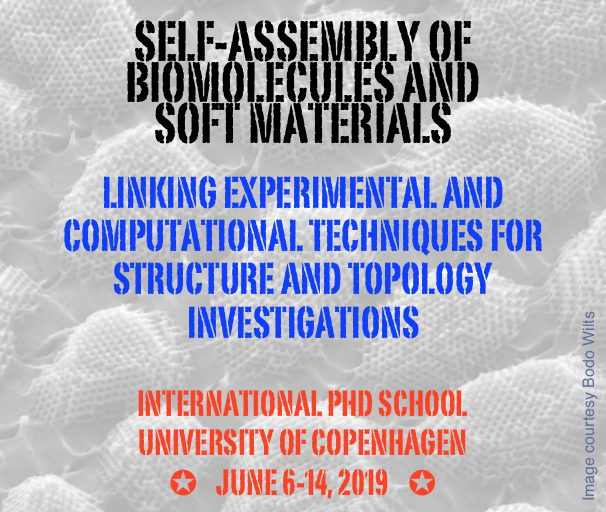SELF-ASSEMBLY OF BIOMOLECULES AND SOFT MATERIALS: LINKING EXPERIMENTAL AND COMPUTATIONAL TECHNIQUES FOR STRUCTURE AND TOPOLOGY INVESTIGATIONS
University of Copenhagen
The self-assembly of biomolecules and soft materials into nanostructures is a key concept in life sciences and many applications. In these systems, complex structures result that respond delicately to changes of environment and to other processes like lipolytic or proteolytic activity. Far beyond their innate beauty, the structural complexity of self-assembled structures is key to their intricate biological function, often in ways that are not yet understood. Given the importance of structure for function, experimental and computational tools to measure ‘structure’ are core ingredients of the necessary toolbox to understand these crucial building blocks of life.
This 5 ECTS PhD course aims to deepen the conceptual understanding of key structures common in life science and soft matter in terms of how they can be identified, characterized both in terms of scattering and imaging techniques as well as modeling using crystallographic and geometrical concepts. It also aims to provide confidence to engage with computational tools to model 3D structure, and an introduction to some of these tools, including structure visualisation and 3D printing. A focus will be on how experiments (including scattering, diffraction, microscopy, optical, etc.) can be used to infer and understand the complex structural features (including topology, symmetry, percolation, etc.) using in particular gyroid-like geometries and bicontinuous phases as examples.
The course will include several lectures on applications of liquid crystalline and lipid phases, that will also touch on foams, proteins, carbohydrate gels, biopolymer networks, particles and emulsions. These will emphasize the relevance of these nanostructured phases to food structure and function, drug delivery and biomedical applications, soft matter functional materials as well as self-assembly in structural biology.
Main themes of the course are
- Complex structures in soft matter and biological tissues, and their polymorphism
- Basic crystallographic concepts
- Curvature, packing, geometry and topology
- Structural transitions – models and observations
- Computational tools for structure analysis and modelling
- Diffraction and scattering techniques
- Imaging and microscopy techniques
- Structure and function relationship – texture, mechanical properties and transport
Requirements to attend course: The course is aimed at Master level or postgraduate students in chemistry, physics, food science, materials science, biology, materials or biomedical engineering, and cognate disciplines. Basic knowledge of Chemistry, Maths or Physics is helpful. The teaching will be focused on basic concepts and understanding rather than mathematical understanding. For this purpose, dedicated exercises will form a core part of the course work. The aim is that the course will be relevant for students working on soft matter systems where nano- and microstructure is important, such as food science, drug delivery and biomedicine, liquid crystals, biomineralisation, plant science and polymer self-assembly.
Apart from the course organizers (see below) a suite of invited international lecturers will contribute to the course, confirmed so far:
Prof. Ben Boyd (Monash University, Melbourne, Australia)
Prof. Erik Lindahl (Stockholm University, Sweden)
Prof. Ole Mouritsen (University of Copenhagen)
Dr. Laurent Sagalowicz (Nestlé S.A., Switzerland)
Dr. Yuru Deng (Changzhou University, China)
Dr. Emma Sparr (Lund University, Sweden)
Dr. Arwen Tyler (University of Leeds, UK)
Dr. Lucja Kowalewska (University of Warsaw, Poland)
The course is free to attend, but all travel, accommodation and meals are at participants own expense. A limited number of participants will be chosen from the applicants.
TO REGISTER PLEASE GO HERE!

